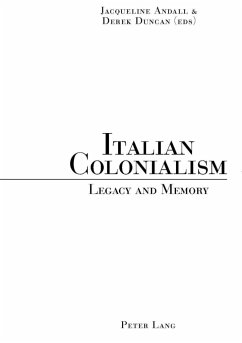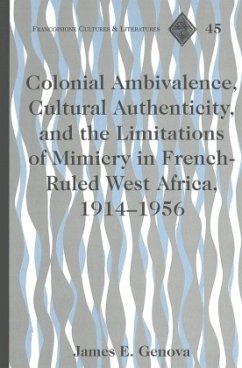
Au sommet de l'Empire / At the Top of the Empire
Les élites européennes dans les colonies (XVIe-XXe siècle) / European Elites in the Colonies (16th-20th Century)
Herausgegeben: Singaravélou, Pierre; Laux, Claire; Ruggiu, François-Joseph
Versandkostenfrei!
Versandfertig in 6-10 Tagen
69,15 €
inkl. MwSt.

PAYBACK Punkte
0 °P sammeln!
À partir du XVI e siècle, les colonisations européennes constituent non seulement un des principaux vecteurs de la mondialisation économique et culturelle mais aussi l'instrument d'une profonde reconfiguration sociale. Ainsi émergent des sociétés coloniales au sommet desquelles s'affirment des élites distinctes à la fois de celles du vieux continent dont elles sont originaires et de celles des mondes américains, asiatiques, africains ou océaniens qu'elles supplantent, remplacent ou dédoublent.Les élites européennes apparaissent comme une des pierres angulaires du système colonia...
À partir du XVI e siècle, les colonisations européennes constituent non seulement un des principaux vecteurs de la mondialisation économique et culturelle mais aussi l'instrument d'une profonde reconfiguration sociale. Ainsi émergent des sociétés coloniales au sommet desquelles s'affirment des élites distinctes à la fois de celles du vieux continent dont elles sont originaires et de celles des mondes américains, asiatiques, africains ou océaniens qu'elles supplantent, remplacent ou dédoublent.
Les élites européennes apparaissent comme une des pierres angulaires du système colonial. À travers une étude comparée des empires sur la longue durée, cet ouvrage analyse l'origine, la formation et la mobilité des élites, leur mode de vie et leurs liens avec les métropoles et les sociétés autochtones. Les contributions d'historiens allemands, anglais, belges, canadiens, états-uniens, hollandais, italiens, portugais, russes et français permettent de repenser la question de la domination coloniale au travers du prisme original de l'histoire sociale.
Cet ouvrage restitue aussi la diversité des élites (colons, noblesses, créoles, administrateurs, militaires, etc.) et des situations coloniales modernes et contemporaines.
From the 16 th century, European colonization paved the way for economic and cultural globalization and for a deep social reconfiguration. As a result, at the top of the colonial societies new elites emerged that were different from those of the old continent and the indigenous elites. European elites seem to be one of the cornerstones of the colonial system. This book highlights the diversity of elites (settlers, nobilities, Creoles, civil servants, officers, etc.) and the variety of colonial situations from the 16 th century to the 20 th century. Neglected for a long time, the history of imperial societies gives a new slant to colonial studies.
A long-term and comparative study of empires sheds light on the origins, education and mobility of elites, their way of life and relationships with metropolitan and indigenous societies. Contributions from American, Belgian, British, Canadian, Dutch, French, German, Italian, Portuguese and Russian historians allow us to rethink the issue of colonial domination through the prism of social history.
Les élites européennes apparaissent comme une des pierres angulaires du système colonial. À travers une étude comparée des empires sur la longue durée, cet ouvrage analyse l'origine, la formation et la mobilité des élites, leur mode de vie et leurs liens avec les métropoles et les sociétés autochtones. Les contributions d'historiens allemands, anglais, belges, canadiens, états-uniens, hollandais, italiens, portugais, russes et français permettent de repenser la question de la domination coloniale au travers du prisme original de l'histoire sociale.
Cet ouvrage restitue aussi la diversité des élites (colons, noblesses, créoles, administrateurs, militaires, etc.) et des situations coloniales modernes et contemporaines.
From the 16 th century, European colonization paved the way for economic and cultural globalization and for a deep social reconfiguration. As a result, at the top of the colonial societies new elites emerged that were different from those of the old continent and the indigenous elites. European elites seem to be one of the cornerstones of the colonial system. This book highlights the diversity of elites (settlers, nobilities, Creoles, civil servants, officers, etc.) and the variety of colonial situations from the 16 th century to the 20 th century. Neglected for a long time, the history of imperial societies gives a new slant to colonial studies.
A long-term and comparative study of empires sheds light on the origins, education and mobility of elites, their way of life and relationships with metropolitan and indigenous societies. Contributions from American, Belgian, British, Canadian, Dutch, French, German, Italian, Portuguese and Russian historians allow us to rethink the issue of colonial domination through the prism of social history.












